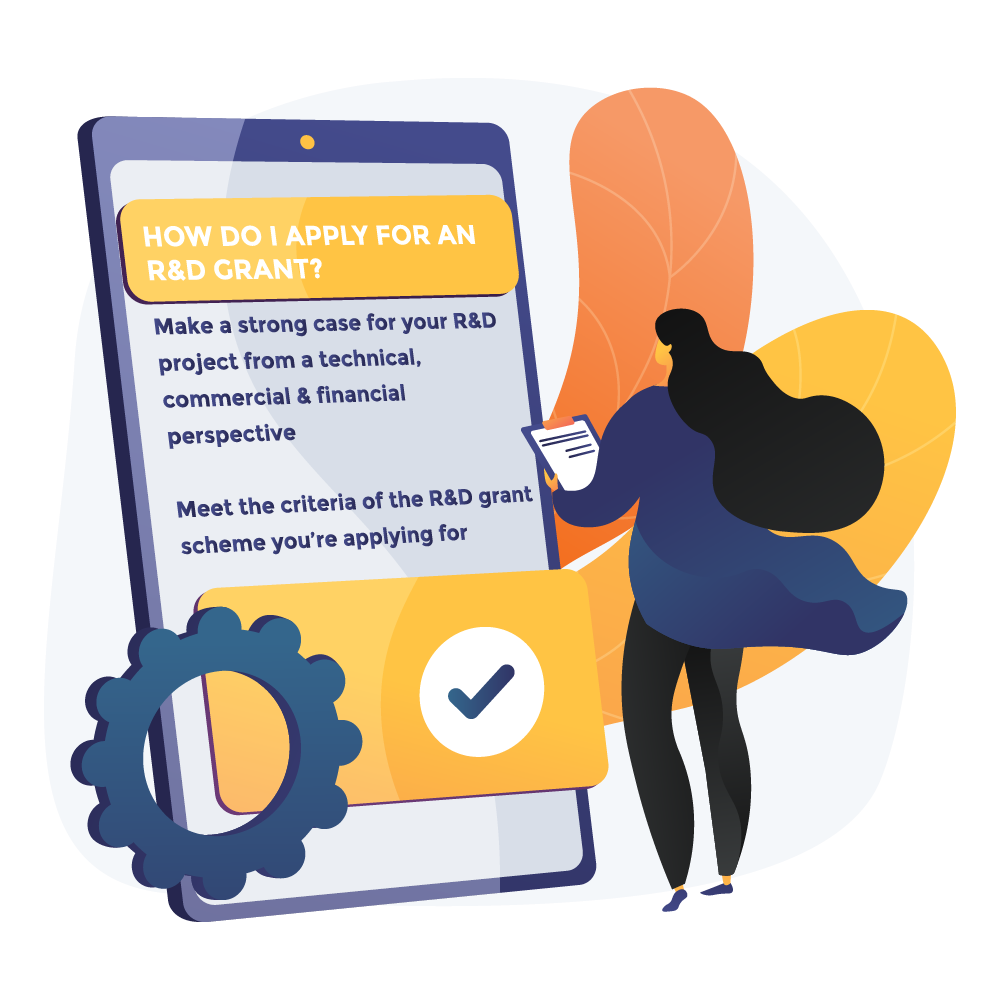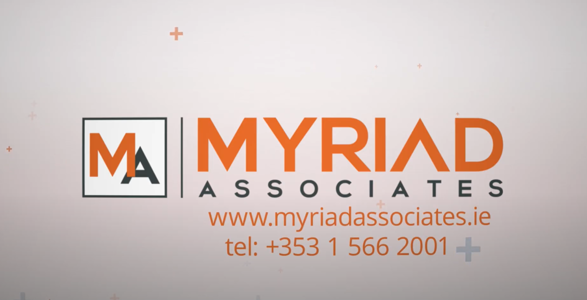Developing a new product, service, or process can be costly, time-consuming and risky. Myriad can help you finance your innovative project by securing R&D grant money from the government that you don’t need to pay back.

Research and Development (R&D) grants are funds provided—typically by governments, non-profits, or private organizations—to support projects aimed at developing new products, services, or technologies, or improving existing ones.
These grants are usually non-repayable and are intended to reduce the financial risk and burden of innovation, especially for startups, academic institutions, and companies pursuing cutting-edge research.
To be successful, your application must describe, in detail, the new commercial opportunity you’ve found, how you plan to exploit it, and how it will transform the market.


Applying for a grant is a time-consuming and resource-intensive process. You need to be able to make a robust case for your innovation, from both a technical and a commercial perspective, for your grant application to be successful.
Each grant competition has its own rules and requirements. You need to ensure that your innovation meets the competition scope and that you are eligible to apply.
Grant applications are usually examined by independent experts in the area of innovation identified in the application. The number of experts scoring the application depends on the awarding body.
Successful projects will involve breakthrough technologies and disruptive innovations that draw on unique strengths from Europe and provide global opportunities to scale up.
Irish companies and organisations can apply for innovation grants from Irish and European funding bodies.
Enterprise Ireland offers a range of grants designed to support Irish businesses in developing innovative products, expanding into international markets, and enhancing competitiveness.
IDA Ireland also offers grants and support, ranging from project assessment and guidance to grants worth thousands of euros.
Research Ireland combines Science Foundation Ireland and Irish Research Council’s resources to offer competitive funding opportunities for Irish companies and researchers.
Horizon Europe aims to shape the future of Europe through research and innovation. It will run from 2021 to 2027 with a budget of €95.5 billion. It targets specific actions for European companies at all different stages.
The European Commission also offers other regional and international grants that Irish companies can access, such as the Digital Europe programme or the European Regional Development Fund.

Myriad have an enviable track record with R&D grant applications. Using our grant application services can give you a significant competitive advantage over other grant applicants.
Our grant bid writers have secured over €300m for our clients in the last three years. We are also very proud to have secured some of the highest-scoring applications in Europe, with five of our projects scoring 15/15.
About Myriad
"Marc and his team assisted Hooke Bio in securing EIC Accelerator funding (blended finance). I doubt we would have successfully navigated the complicated EIC process and portal without Marc's in-depth knowledge of the portal's structure and strategic grant writing. He has fantastic attention to detail, is easily contactable and always very clear with his feedback. Marc's assistance does not end with notification of the funding; he continues to advise, assist and put us in contact with others in his vast network who have received similar funding."





Dr Finola Cliffe
Hooke Bio Ltd
"Marc and his team have been an excellent support to Luminate, advising on DTIF and EIC Accelerator grant submissions. They have an obvious understanding of the funding requirements and have supported us through all phases, from grant writing to interview preparation. I would highly recommend him for support on deeptech funding applications."





Aaron Hannon
Luminate Medical
“Marc and the Myriad team helped us apply for and secure an EIC Accelerator Grant. I would recommend Marc and the wider team to anyone applying for this or any other type of funding. He has an incredible talent for structuring and writing technical content such that it is both easy to understand and compelling and a knowledge of the process that is second to none. Consultants often have a sometimes-earned reputation for "give me your watch, and I'll tell you the time". Marc could not be more different to this. His optimism, proactivity, resilience and sense of humour kept us going through a challenging process from beginning to end. I lost count of the number of times he has said, "Don't worry, I'll do that". He's also a great bloke, and I look forward to having the opportunity to work with him again in future.”





Dominic Griffiths
Alesi Surgical
"Marc is the best in the grant funding business, with a stellar success rate at innovation funding mechanisms. He acts as a guide to enable the reviewer to be the hero - clarifying your message so the audience will listen - and his approach works. I've heard Marc described as a great grant writer and editor, but that description is an injustice to his deep expertise, effort, and skill. We've had a 100% success rate for all applications we've worked with Marc - notably EIC Accelerator grant-first (plus future equity) success in 2021."





Stephen Cox
Invera Medical
“Kite Medical had the pleasure of working with Marc on a recent grant application to the EIC Accelerator, which was successful. Marc became part of our team during this time and was a consistent calming influence. He is so knowledgeable about this process and works so efficiently that it significantly enhanced our experience. We would be more than happy to recommend Marc and his team at Myriad.”





Joan FitzPatrick
Kite Medical
"Lauren and the Myriad team helped us apply for and secure funding through the Disruptive Technologies Innovation Fund (DTIF). Lauren was instrumental in our success, providing CergenX and the other consortium members with clear guidance, advice, and writing expertise. I look forward to continuing this working relationship, and I would recommend Lauren and the wider team to anyone applying for this or any other funding of this type."





Jason Mowles
CergenX
"The Galenband team collaborated with Lauren through Myriad to prepare our grant submission. Throughout this process, Lauren demonstrated a wealth of knowledge, offering insights and clarity on the nuanced details of a grant application. This significantly expedited and streamlined the proposal and interview preparations. We look forward to continuing our collaboration with Lauren during the grant agreement process and sincerely appreciate the support received thus far."





Oisín McGrath
Galenband
"We worked with Lauren and Marc at Myriad for over a year in preparing our submission for the EIC Accelerator, and they were a pleasure to work with during that time. They helped us with every step from proposal writing to interview preparation and were key to our success in securing the approval for a Grant-First Award of €2.5m followed by €6m in equity. We continue to work with Lauren and Marc since their experience is invaluable in the ongoing management of our grant, and it frees me up as CEO to focus on driving the business, knowing that I am in their safe, guiding hands. I couldn't recommend Lauren, Marc and Myriad highly enough!"





Peter F Doyle
BioSimulytics
"We worked with Lauren and Marc at Myriad for over a year in preparing our submission for the EIC Accelerator, and they were a pleasure to work with during that time. They helped us with every step from proposal writing to interview preparation and were key to our success in securing the approval for a Grant-First Award of €2.5m followed by €6m in equity. We continue to work with Lauren and Marc since their experience is invaluable in the ongoing management of our grant, and it frees me up as CEO to focus on driving the business, knowing that I am in their safe, guiding hands. I couldn't recommend Lauren, Marc and Myriad highly enough!"





Mark Brassil
Smart Reactors Ireland and Cerefuze Medical Devices UK Ltd
"Working with Myriad on our EIC grant submission was more than a pleasure. They have much experience in grant writing. We were successful with their expert guidance and support. Thanks for all your help, Myriad! You did a great Job!"





Shahar Shaked
BioProtect Ltd
“As a result of working with Myriad, we have secured grant funding on three separate occasions, and we're currently waiting for the results of another grant application we've made. We certainly think that with Myriad’s help, we've been able to produce a very strong application.”





Chris Stanford
Arden Biotech
”Once we met with Marc, it became apparent he understands precisely what the EU is looking for. Even though it was our grant, our proposal, and it was for our company, we could feel he was invested in it. He just had little ideas that really helped to make sure we got all the marks that were going."





Dr Kate Reddington
BioProbe Diagnostics
"Marc and the Myriad team are such pros; his work ethic and attention to detail, coupled with his strategy guidance, are so compelling, and his results speak for themselves; it can't be all down to luck.”





Tony Killarney
ONK Therapeutics

No, grants are typically non-repayable unless the terms are violated (e.g., funds are misused).
Grant amounts vary widely depending on the program, from a few thousand (e.g., Innovation Vouchers) to millions (e.g., Horizon Europe or DTIF).
Commonly covered costs include salaries for R&D staff, materials, subcontracting, equipment, and overheads directly related to the project.
Grants often fund activities that support the research and development of an innovative product, service or process, such as:
Many programmes target specific points in the lifecycle of a project; aligning your R&D grant with your “Technology Readiness Level” is crucial.
Yes. Programs like feasibility study grants or Innovation Vouchers are designed for the early exploration of new concepts.
Eligibility varies by programme but often includes startups, SMEs, universities, research institutions, and occasionally large enterprises. Some grants also provide funding for consortia of multiple partners.
Yes, many programs (like Horizon Europe or Eurostars) encourage or require partnerships across countries.
Applying for a research and development grant requires a considerable time commitment.
Myriad would recommend that you follow the below process if you plan to submit your own application for R&D funding:
Your grant application is more likely to be successful if it:
Grant applications are usually examined by independent experts in the area of innovation identified in the application. The number of experts scoring the application depends on the grant awarding body.
Each R&D grant scheme has its own timeline for providing feedback and a decision on funding. It could take a few weeks, or it could be several months.
Some schemes have multiple stages, each with their own timeline.
If your application is successful, you must provide the information required by the grant awarding body, which may include further documentation and financial checks. Depending on the awarding body, you may be assigned a monitoring officer.
Funding is generally paid in arrears once the required audits and reports are complete. Each grant-awarding body has its own payment rules.
Grant recipients usually must submit progress reports, financial statements, and a final report detailing outcomes and expenditures.
Grants are upfront or milestone-based funding, while tax credits (like Ireland’s R&D Tax Credit) reduce your tax bill based on qualifying expenditures.
Yes. You can receive R&D grant funding and claim R&D tax credits for the same project. However, you cannot claim R&D tax credits on any costs that were funded by a grant, only on the self-funded portion.
Yes, but double funding of the same costs is prohibited. Ensure each application targets distinct projects or aspects.
Yes—Myriad offers grant bid writing services to companies looking to apply for innovation grants. However, you are also able to get support from many of the funding bodies to best position your project.
Step 1 of #
Thanks for that!
We would like to help you decide whether your business meets the relevant criteria and whether any credits can be applied for the R&D projects you’ve undertaken. Please click on the button below to speak with an expert.
Thanks for that!
We would like to help answer any questions you have regarding the R&D tax credits scheme. Please click on the button below to speak with an expert and one of our specialist team will get in touch.
Thanks for that!
We would like to help answer any questions you have. Please click on the button below to speak with an expert and one of our specialist team will get in touch.
Speak to an expert Back